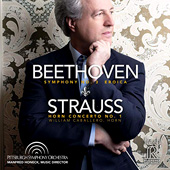
ESSENTIAL RECORDINGS

One element in music that Beethoven absolutely enjoyed experimenting with, to such an extent that most of his unorthodox and innovative machinations became the new standard, is rhythm and the intrinsic role it plays on form and development. And his Symphony No. 3, Op. 55 "Eroica" is loaded with these quirks, most particularly the Scherzo, with all of its twists and turns, and constantly shifting accents. And lo and behold did I notice when reading the booklet notes that conductor Manfred Honeck points out that rhythm is one of the key factors that made this symphony such a game changer. And this is how he and the members of the Pittsburgh Symphony Orchestra interpret and project this score. The rhythmic momentum is upbeat, the accents are punchy, the overall spirit of the work is lean and muscular, in other words an altogether different perspective on the symphony when compared to HIP (Historically Informed Performance) interpretations. This is a symphony that, back in 1805, was considered overly long, and technically demanding on the musicians of the day. What a difference two centuries hence make on opinions and perspectives. The PSO players make it sound fresh, effortless, and most importantly as innovative today as it seemed two hundred years ago. Special distinction should be given to the brass players as they pull off some special magic during certain key passages.
As a filler, if you can call it that, they've included the Horn Concerto No. 1, Op. 11 by Richard Strauss. At first glance I myself thought that it was a bad choice, and would, like a strange roommate, make for an uncomfortable transition from piece to piece. But this concerto is so "classical" in form and style when compared to his Horn Concerto No. 2 (written 60 years later when Strauss was Strauss) that when it starts one could be justified for thinking it's a newly discovered work by Beethoven. William Caballero, principal horn for the PSO, plays it with flair and character in keeping with its early provenance, but also demonstrates how far Richard Strauss was already stepping out of the status quo, and demanding more from the french horn, as a solo instrument.
These are "live" recordings taken from concerts in 2017 and 2012 respectively, and again the people at Reference Recordings demonstrate how it's done by fooling me into thinking that they were studio takes.
Jean-Yves Duperron - September 2018